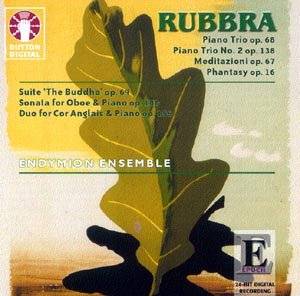EDMUND RUBBRA CHAMBER WORKS
Phantasy for two violins and piano Op 16;
Meditazioni sopra Coeurs Desolez Op 67 [version for oboe and piano];
Suite The Buddha for flute, oboe, violin, viola and cello Op 64;
Piano Trio No 1 in one movement Op 68;
Sonata in C for oboe and piano Op 100;
Piano Trio No 2 Op 138;
Duo for Cor Anglais and piano Op 156
 Endymion
Ensemble
Endymion
Ensemble
 Dutton
CDLX
7106
Dutton
CDLX
7106
Crotchet

This is the second CD from Dutton of Rubbra's music. The first came out last
Autumn and includes the three Violin
Sonatas[CDLX 7101]. Violinist
Krysia Osostowicz and pianist Michael Dussek feature again which is good
because they have developed a real feel for the music. Again Dutton's
presentation is excellent - a colourful booklet, informative and interesting
liner notes, this time by Martin Anderson and all at mid-price. Each of these
works is worth dealing with in turn beginning with the 'Phantasy' of 1927.
Catherine Manson is the extra violinist in this intense performance.
In 1976 to celebrate Rubbra's 75th birthday our own Lewis Foreman
edited a collection of essays entitled 'Edmund Rubbra - Composer'. The late
Harold Truscott wrote about this Phantasy in some considerable detail, and
added, " I have devoted some space to this early work because I have long
believed to be the first… key work in Rubbra's development. And earlier
he had remarked that "it reveals the workings of Rubbra's mind". I never
thought that I would hear this piece, but now having done so I feel quite
knocked over by it. It has the typical harmonic qualities which you find
in his early works,[like for example the 1st Violin Sonata] perhaps
a Ravellian influence, but it an astonishingly contrapuntal work, which gradually
achieves its glorious climax. It has not been heard for decades.
The 'Meditazione' has been often recorded, memorably in the early 70s by
David Munrow. When Rubbra uses the word Meditation, which he does in several
works, for example the Op117 'Meditations on a Byzantine Hymn' for viola,
he is really offering a spiritual kind of variation technique in which he
works around and views the theme from unusual angles. This is one of seven
works which uses the recorder. It is good to hear it for oboe and piano and
proves that the piece works beyond the confines of the original recorder
and harpsichord.
Likewise the Oboe Sonata has had several recordings. I have always enjoyed
the LP recording from 1981 of Peter Bree and Paul Komen. It is they who also
recorded the 'Duo' for Cor Anglais and piano having given its premiere at
the Wigmore Hall just 6 months before. Incidentally this new recording of
both works is considerably more leisurely which I feel is good thing in the
'Duo', as this is an autumnal work well suited to the instrument.
The Suite The Buddha was reconstructed by Adrian Cruft [1921-87] a
pupil of Rubbra's, with his permission, from incidental music written for
radio in 1947. This was at a time when Rubbra was very sympathetic to eastern
religions as was his friend and ex-teacher Cyril Scott [1879-1970]. It is
a set of attractive miniatures, which is good to have recorded, as it seems
unlikely that a concert performance would ever materialise.
The Holywell Piano Trio in an unconvincing acoustic recorded the Two Piano
Trios on the now defunct Devorguilla label in 1993. The Hertz Trio recorded
the first trio magnificently the previous year for CBC [MVCD 1042] now this
new recording appears to add to our understanding of this great and original
work. A more focused violin tone than the Holywells and a more sensitive
pianist than the Hertz achieves a perfect combination. I had always felt
that the 2nd trio a fine work [although not as convincing as the
1st] and again this performance proved it, reminding me of a radio
broadcast I cherish from 1976 when the composer I think played the piano
part.
So to recap, an excellent release in every way, well worth the investment
and hopefully a pointer to perhaps a third CD, if so, perhaps it might include
the beautiful Lyric Movement Op. 24 for Piano Quintet.
Gary Higginson

See also review by Peter
Grahame Woolf

